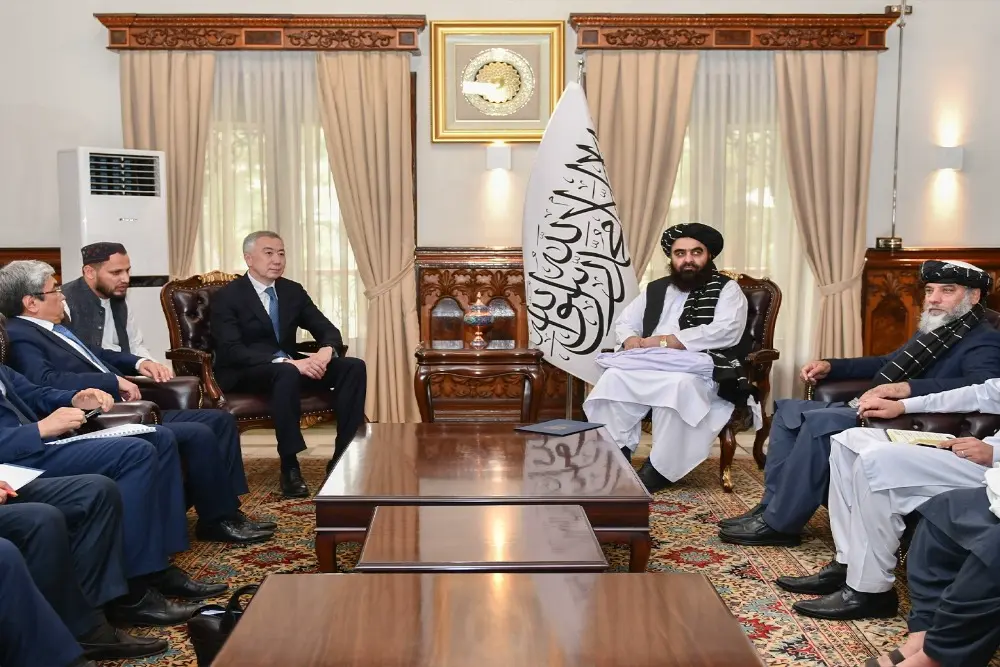
The improvement in Afghanistan’s security is not only a consequence of the Taliban ceasing the hostilities that had continued until August 2021. The movement has also made great strides in fighting everyday crime as well. With no armed opposition in the country, this has had a positive effect on the overall atmosphere in society. Terrorist attacks against the Taliban – publicized by various kinds of “anti-Taliban” groups that are mainly directed from the U.S., Europe and Turkey – are most often virtual in nature. No institutional opposition to the Taliban has emerged in the country since August 15, 2021, and only virtual platforms are filled with bids to fill this “vacancy.” Meanwhile, the Taliban government is showing a certain evolution in its policies, which will continue if the peaceful scenario unfolds. Thus, the system of governance, including the counterterrorism component, should become more effective.
Intelligence services of Iran, Russia and Uzbekistan, as well as agencies of the CIS and CSTO, are now cooperating with the Afghan General Directorate of Intelligence on counterterrorism, and this interaction is yielding some positive results. In February 2024, head of Uzbekistan’s State Security Service Abdusalom Azizov visited Kabul – a sign of high-level cooperation. The information provided by Afghanistan’s intelligence directorate has helped prevent at least 15 terrorist attacks in Iran. The Taliban view ISIS not only as ideological adversaries but also as a foreign and alien movement and political phenomenon that could plunge Afghan society into another catastrophe. This has paved the way for cooperation in counterterrorism efforts.
In August 2021, the Taliban’s rise to power caused quite a stir in radical circles around the world, where it was billed as a success story for the entire Muslim Ummah. However, this excitement has largely died down. For example, the well-known extremist party Hizb ut-Tahrir criticizes the Taliban for “refusing to go beyond Afghan borders, curtailing jihad and withdrawing support from the oppressed in Western China, Central Asia and Palestine.” The group argues that radicals from the region had expected the Taliban to help “ erase colonial borders and restore Islamic rule, but instead, their actions play into the hands of the enemies, leading Afghan Muslims astray as they can no longer distinguish between good and evil.” It is fair to assume that further constructive cooperation between the countries of the region and the Kabul government will gradually dispel the “success story” for radicals beyond Afghanistan’s borders.
This moderately optimistic scenario can materialize if no external actors try to contribute to destabilizing the situation in Afghanistan, including through proxies such as international terrorist groups or those identifying as anti-Taliban. None of these groups currently pose any threat to stability in Afghanistan or have any significant support in the country. At most, they can carry out sporadic terrorist attacks (mostly targeting patrols or posts of government security forces). It makes no difference whether we describe these actions as “terrorist” or use the more palatable term “sabotage,” since the methods of anti-Taliban groups and ISIS are virtually identical.
The second scenario is undoubtedly pessimistic. External actors with vested interests might exploit the lingering uncertainty in Afghanistan and finance “anti-Taliban” or terrorist groups. Heightened activity by these groups would cause instability across the country to rise, resulting in a decline in Afghanistan’s economic cooperation with regional partners. The country could then face some degree of isolation from external actors, which could entail both internal fragmentation of the Taliban (with some members joining terrorist groups) and radicalization of the movement as a whole. In this case, the Taliban could realign with the global terrorist network, as they did in the late 1990s and early 2000s. This scenario would essentially mirror the events of that period, undoing all current trends toward a gradual and sustainable settlement. Afghanistan’s territory would once again become a base for international terrorist groups, where threats much greater than those seen today would be brewing for the SCO member states and other regional stakeholders.
There are symptoms or signs pointing to the possibility of this scenario. In July 2024, Republicans introduced a bill in the U.S. Congress titled “Preventing the Recognition of Terrorist States Act of 2024,” which labels the Taliban movement as a “state sponsor of terrorism” and a “terrorist organization.” During the same month, former U.S. National Security Adviser John Bolton called for military and economic aid to “resistance groups inside Afghanistan.” The U.S. could start financing the opposition, which would trigger an escalation of conflict in Afghanistan. This would bring the region a host of threats and risks, creating a kind of déjà vu of the 1990s. The U.S. and its allies have enough resources for this endeavor: a proxy war in Afghanistan is not as technologically and financially demanding as, for example, the conflict in Ukraine. If Donald Trump wins the presidential election, this approach might become a reality in U.S. and European policy toward Afghanistan.
At this point, taking all internal and external factors into account, it is not possible to confidently predict how likely it is that all processes will turn toward a fully optimistic scenario. However, there is no strong reason to expect a purely negative scenario either. This long-standing uncertainty is likely to persist much longer, which will require the SCO and CIS member states to make regular situation-specific recalibrations of their actions concerning Afghanistan, including in counterterrorism efforts. In any case, cooperation with the de facto government in Kabul in this area has been tried and tested, and it would be prudent to expand this cooperation moving forward.










Comments